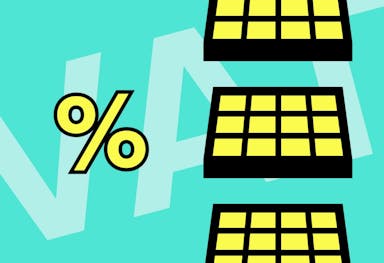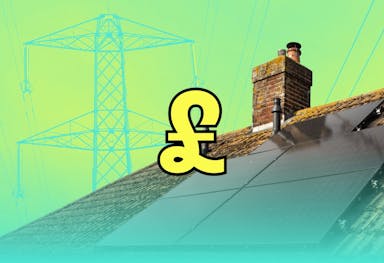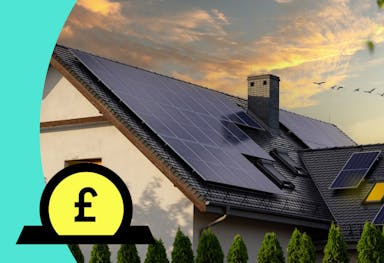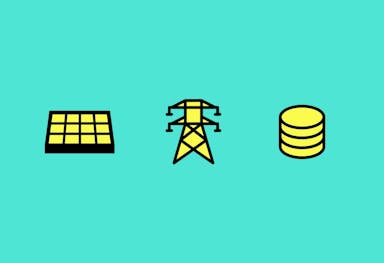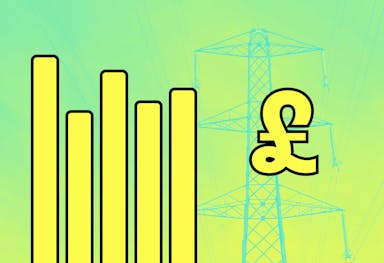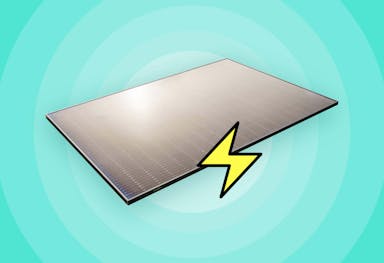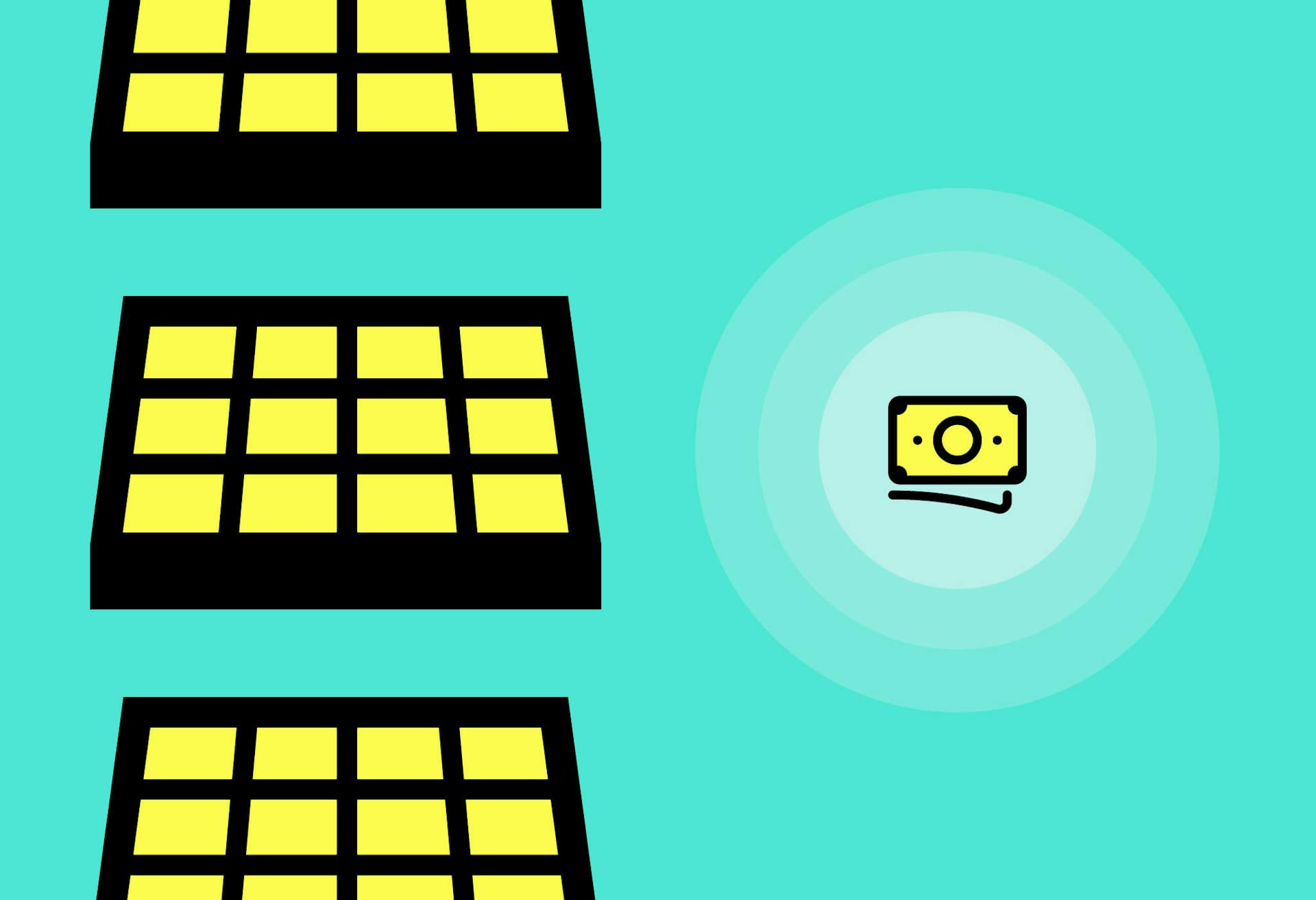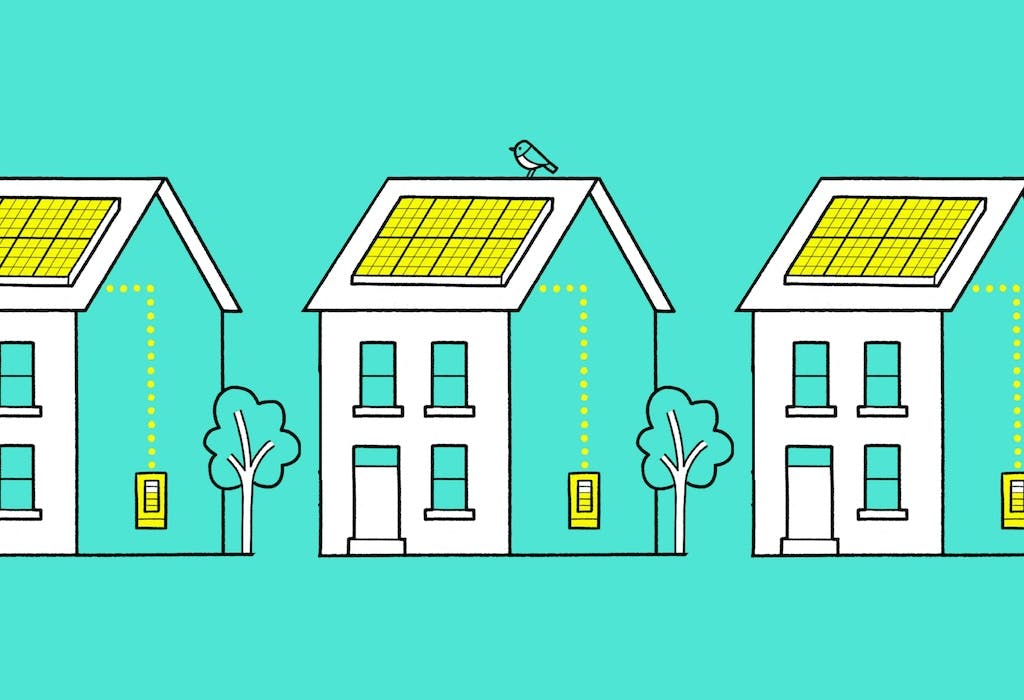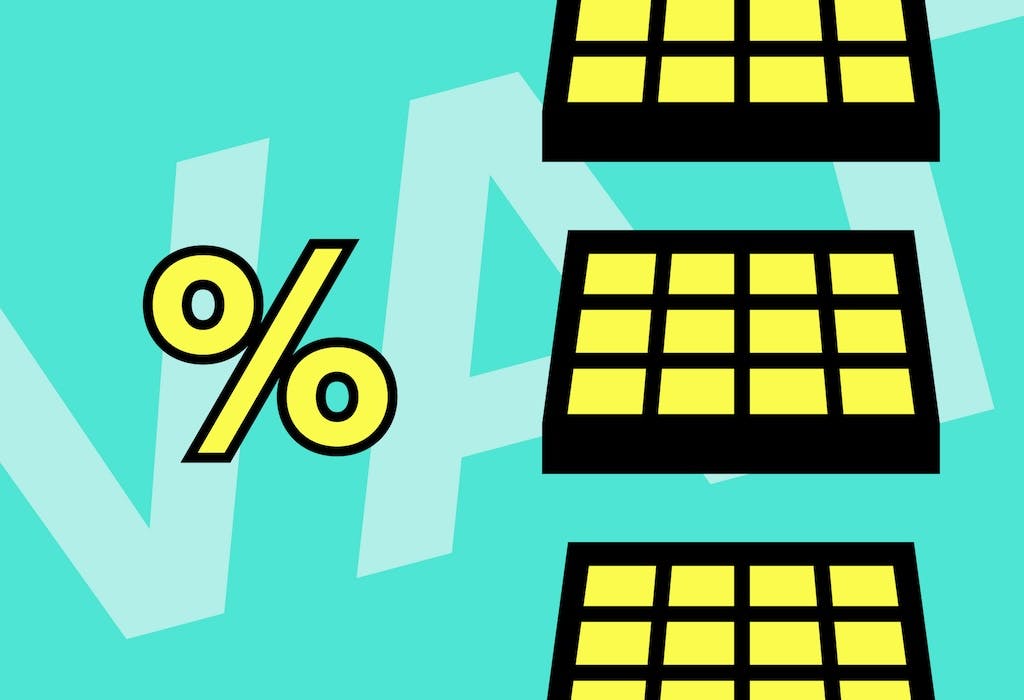- Solar advice hub
- Costs
- The 12 best solar panel grants & funding options UK
The 12 best solar panel grants & funding options UK
Discover which solar panel grants you're eligible for with our calculator, how much they can save you, and how you can access them.


Why you can trust our content
We know that the solar industry is full of misinformation, but we only use reliable sources, including:
- Our experienced solar experts, installers and system designers
- Our own database of solar & battery system designs
- Authoritative bodies like MCS and the UK government



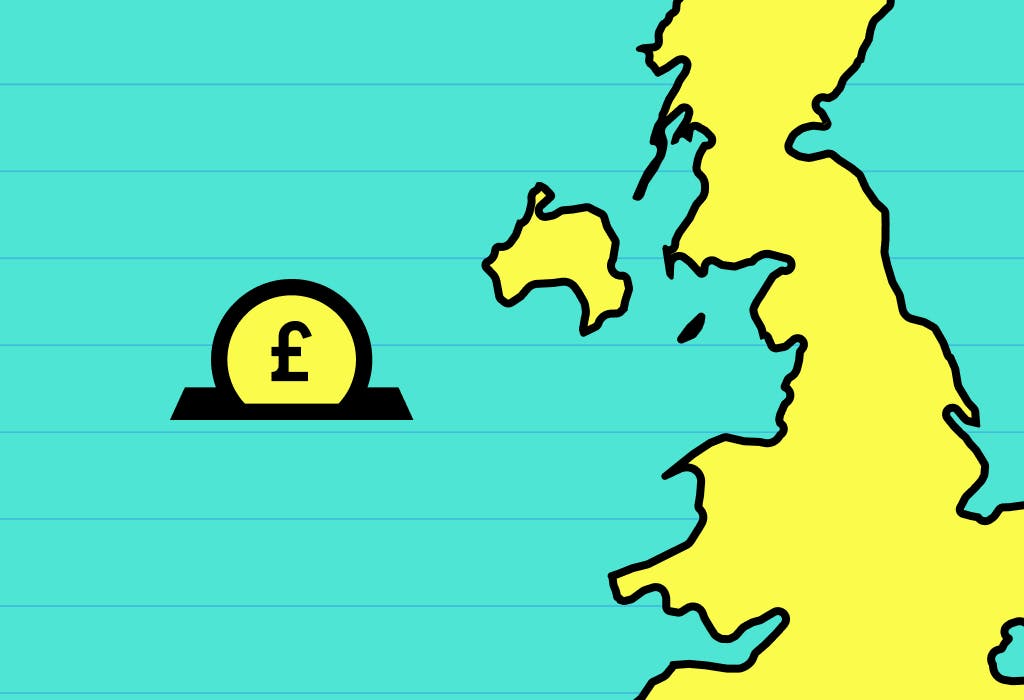
Calculate savings
What kind of home do you live in?
Calculate savings
What kind of home do you live in?
Solar panel grants: at a glance
Going solar is an extremely effective way to cut your electricity bills, but not everyone can afford the steep upfront cost – especially low-income households which are struggling the most.
There are some grants available, but they come with stringent eligibility criteria, as they're targeted at the most deprived homes in the country.
In this guide, we'll run through all the various initiatives, identify which households could qualify, and consider whether a solar subscription with no upfront cost could be the answer for you.
To find out how much you could save by going solar, enter a few details below and we'll provide an estimate.
Find out how much you can save
What kind of home do you live in?
What are the grants and schemes for solar panels?
| Grant/scheme | What it covers | Eligibility | Potential funding | When it expires |
|---|---|---|---|---|
| 1. ECO4 | Energy-saving improvements, including solar panels | Electrically heated households with a resident who gets a qualifying benefit (England, Scotland, & Wales) | Up to 100% | 31 December 2026 |
| 2. The Warm Homes Plan | Measures including solar panels, batteries, insulation, and heat pumps | TBD | Up to 100% for low-income & fuel-poor homes | TBD |
| 3. Warm Homes: Local Grant | Low-carbon heating systems and energy efficiency upgrades | Energy-inefficient homes that are low-income, deprived, or get a qualifying benefit (England) | Up to £15,000 | 31 March 2028 |
| 4. Smart Export Guarantee | Payment for surplus energy exported to the grid | Households with eligible solar installations (UK-wide) | £100s per year | Ongoing |
| 5. Solar panel loans | Up to 100% of the upfront cost of your solar installation | Varies by loan provider (UK-wide) | No upfront cost | Varies by loan provider |
| 6. Green home rewards | Cashback on energy-efficient measures | Households with a qualifying mortgage (UK-wide) | Up to £1,000 | Varies by institution |
| 7. VAT discount | 0% VAT on solar panel installations | All households, no specific conditions (UK-wide) | Around £565-£2,260 | 31 March 2027 |
| 8. Warm Homes: Social Housing Fund | Energy efficiency upgrades for social homes | Any local authorities, providers, and charities that own social housing (England) | Up to £7,500 | 30 September 2028 |
| 9. Welsh Government Warm Homes Programme | Home energy efficiency improvements | Energy-inefficient households which receive a means-tested benefit or are low-income (Wales) | Up to 100% | April 2031 |
| 10. Green Homes Wales | Home energy efficiency measures | Homeowners (Wales) | 0% loan up to £25,000 | 31 March 2027 |
| 11. Social housing PPA schemes | Installation of solar panels on social housing | Social housing providers (UK-wide) | 100% | Varies by scheme |
| 12. Solar Together | Group-buying scheme for discounted solar panels | Residents in participating areas (England & Wales) | 30-35% saving | Varies by locality |
Information correct as of January 2026. We constantly monitor the status of all national solar incentives, and update the table regularly.
There are grants and schemes that can wholly cover the cost of solar panels, but it depends on your circumstances.
Low-income and energy-inefficient households can access one of these initiatives, as long as they're electrically heated, in social housing, or live in Wales or England.
One of these schemes is the Warm Homes Plan, which the government launched in January 2026. It'll include some level of funding for solar installations, but the start date and eligibility criteria are both currently unclear (more detail below).
Other schemes provide incentives including loans, discounts, and cashback payments. Their eligibility requirements and end dates vary.
And in good news for everyone, all homes can access the current 0% VAT rate on domestically installed solar panels and batteries.
These initiatives are all built to get more households running on solar electricity, which cuts their bills and the nation's carbon emissions.
If you think you're not likely to qualify for any of these grants but are concerned about the upfront cost of solar panels, you should consider a solar subscription.
If you find that you're not eligible for any grants, it's important not to choose a cheap, low-quality installation, as this comes with far too many risks.
There are also several old government grants that have ended entirely or no longer offer funding for solar panels, like the Home Upgrade Grant and the Home Energy Scotland Grant & Loan.
You may well see these initiatives incorrectly referred to as currently available on some other sites. So you don't make the same mistake, we have a section on defunct grants and schemes lower down.
Are you eligible for a solar panel grant?
Wondering if you qualify for any of the government grants for solar panels? We've built a calculator to help you find out. Answer a few quick questions, and we'll immediately let you know whether you're likely to qualify.
However, please be aware that this tool should only be used for a rough indication of eligibility. To find out for sure if you qualify for any grants, you should follow the official application procedures (as described further down).
The calculator also doesn’t currently include the Warm Homes Plan, since the government hasn't yet revealed the scheme's eligibility criteria.
How do I qualify for free solar panels in the UK?
You may qualify for free solar panels if you're eligible for one of the UK’s four main grants.
However, two of these grants are only available in England, one can only be accessed in Wales, and all of them come with stringent qualifying criteria that target the most deprived households.
That all means that just 13% of the 27 million UK households that don’t yet have solar panels are eligible for a grant, according to our analysis of government data.
Thankfully, a lack of government funding hasn’t stopped the popularity of solar panels from skyrocketing all over the country.
Between August 2022 and August 2024, more than 312,000 households switched to solar , which is around one-fifth of the UK’s total number of domestic solar installations – but only 12.7% were funded by a grant.
If you want to know more about the methodology we used to make all of these calculations, we’ve explained it in depth near the bottom of the page.
Note: this analysis excludes the Warm Homes Plan, as the eligibility criteria hasn't yet been revealed, and it’s unclear when the scheme will begin.
Grant eligibility for UK households without solar
What if I don’t qualify for any solar grants or schemes?
If you don't qualify for any solar panel grants, there's another way to start benefiting from solar electricity with no upfront cost.
Sunsave Plus, the UK’s first solar subscription, will provide you with best-in-class kit, all in one easy solar & battery package.
Your installation will be tailored to your home, work seamlessly, look excellent, and save you money from day one.
You'll also benefit from the Sunsave Guarantee for the length of your subscription. This includes 24/7 monitoring, downtime cover, a free battery upgrade, and an inverter replacement.
Your system will also be insured by Aviva against damage, fire, and theft.
Lots of households across the UK are now subscribed to Sunsave Plus and making net savings every year. To learn more, check out our reviews page.
If you want to learn all about the different grants available, whether you're likely to qualify, and what your options are if your household isn't eligible, watch our video:
Are there any upcoming solar panel grants?
There are no upcoming solar panel grants, following the launch of the £15 billion Warm Homes Plan.
This scheme was technically announced in 2024, but the government released more details, including funding amounts, in January 2026.
It will cover up to 100% of the cost of solar installations for low-income and fuel-poor households, and provide interest-free and low-interest solar loans to other households.
However we still don’t know what the eligibility criteria will be, or when any of the funding will be available.
The government will likely reveal these details at some point in the coming months, so keep an eye out.
As more aspects of the Warm Homes Plan emerge, we'll update this page.
1. ECO4
| Feature | Info |
|---|---|
| Requirements | Stringent |
| How to apply | Contact your chosen energy supplier |
| Area covered | England, Scotland, & Wales |
| Solar costs covered | Up to 100% |
| When it started | July 2022 |
| When it ends | December 2026 |
The fourth phase of the government's Energy Company Obligation scheme (ECO4), which aims to reduce fuel poverty and carbon emissions across Great Britain, began in July 2022.
The £4 billion scheme is set to end in December 2026.
The initiative compels energy suppliers with more than 150,000 customers – like British Gas, Octopus, and OVO – to carry out domestic energy efficiency measures such as solar panels, heat pumps, and insulation in disadvantaged households.
These improvements must increase each home's Energy Performance Certificate (EPC) rating. For example, households in Bands F and G must reach a D for the project to count towards a supplier's total number of homes helped.
Suppliers implemented more than 767,000 measures under the scheme within its first three years, including more than 47,000 solar panel system installations.
The initiative doesn't include solar batteries though, so you'd have to fund that purchase yourself.
To learn more, check out our full guide to the ECO4 scheme.
Are you eligible for ECO4?
You can qualify for ECO4 if you’re a homeowner, private renter (with your landlord's permission), or social housing tenant.
You must also receive at least one of the following means-tested benefits:
- Pension Credit
- Universal Credit
- Income-based Jobseekers Allowance
- Income-related Employment & Support Allowance
- Income Support
- Housing Benefit
- Child Benefit (with an annual income below specified thresholds, depending on who lives with you)
If you live in social housing and your property has an EPC rating of D, E, F, or G, you can also qualify for ECO4 measures.
And if you're not claiming the above benefits but earn under £31,000 per year, have health conditions worsened by a cold home, or are vulnerable to the effects of living in a cold home, you may also be able to qualify through your council's ECO4 Flex programme.
In the end though, suppliers will decide which measures – if any – to offer your household, so make sure you get multiple companies to assess your needs and propose improvements.
To get solar panels, you must use an electric heating system.

LA Flex: explained
The Local Authority and Supplier Flex (LA Flex) scheme is an extension of ECO4 that enables councils to help deprived homes which don't match ECO4's eligibility criteria.
Requirements differ from council to council, but if you've been in fuel debt for more than 13 weeks, started repaying your fuel debt through third party deductions, or disconnected yourself from a pre-payment meter, you may well be able to get help.
Households with a supplier that's either provided them with credit in the past 13 weeks or entered into an energy debt repayment plan with them may also be eligible.
To see if you could qualify for LA Flex, just contact your local authority. The government has directed half of ECO4's funding to LA Flex, so it's definitely worth checking.
How much money can ECO4 save you?
The amount of money you can save with ECO4 varies depending on the changes a supplier chooses to make.
However, the grants given under the ECO4 scheme can be substantial, potentially covering the entire cost of a new solar panel system and other eco-friendly improvements, which can make a big difference to your energy bills.
How to apply for ECO4
To apply for the ECO4 scheme, you’ll first need to find out whether you’re eligible, which you can do by completing this Ofgem questionnaire.
If you think you may be eligible, get in touch with one (or a few) of the energy suppliers in the ECO4 scheme. You don't have to go with your current energy supplier; you can choose any of the companies involved.
The supplier will then assess your application. When it comes to solar panels, they'll focus on whether you primarily use electric heating, receive a qualifying benefit, and earn less than a certain amount per year.
If you pass, a professional will assess your home and recommend measures that could improve its energy efficiency.
Your chosen supplier will fully fund the improvements, so you don't need to think about the financial aspect unless you're getting an additional measure.
How many people get solar through ECO4?
47,513 homes received solar panels through ECO4 within the first three years of the scheme.
This is a substantial number, but it's still less than 0.2% of all UK households.
It's also a mere 6.2% of the improvements made to homes under the scheme, showing that energy suppliers are somewhat reluctant to pay for solar panel installations.
In contrast, heating controls – which are much easier and cheaper to install – make up 52% of ECO4 measures.
Most common ECO4 home improvements, Jul 22 - Jul 25
ECO4 isn’t available for most people, but you can still go solar with no upfront cost if you sign up to the UK’s first solar subscription, Sunsave Plus.
To find out how much you could save, enter a few details below and we'll provide an estimate.
Find out how much you can save
What kind of home do you live in?
2. Warm Homes Plan
This £15 billion government scheme, announced in January 2026, aims to upgrade five million homes by 2030 – though it remains unclear when this funding will be actually available, and who exactly will be eligible.
Home improvements including solar panels, batteries, insulation, and heat pumps are set to be heavily discounted, installed for free, or offered with low-interest loans, depending on your situation.
The scheme will provide homes in England with:
- £5 billion to fund free upgrades for low-income households and homes in fuel poverty
- £2 billion towards interest-free or low-interest loans for people who can afford them, to pay for upgrades like solar panels
- £2.7 billion for innovative finance schemes like green mortgages
- £2.7 billion for the Boiler Upgrade Scheme, which includes £7,500 discounts on air source heat pumps, and will now provide £2,500 discounts on air-to-air heat pumps
- £1.1 billion for heat networks
The remaining £1.5 billion in funding will go towards other Warm Homes Plan programmes and Scotland, Wales, and Northern Ireland.
So if you live in a low-income household, you may well be able to get a solar & battery installation for free through the scheme.
And if you don’t, you should be able to access a loan with minimal or zero interest that can help you fund a new solar & battery system.
The government has said the Warm Homes Plan “could put solar panels on the roofs of up to three million more homes by 2030”, which would result in a total of 4.6 million solar homes by the new decade.
At our current installation rate, the UK will reach this mark by December 2042 – so 2030 is an ambitious target.
Are you eligible for the Warm Homes Plan?
The government hasn’t yet explained the Warm Homes Plan’s eligibility criteria.
In its document outlining the scheme, it said: “We will set out further details of the scheme’s eligibility later this year.”
So far, it’s only clear that “low-income and fuel poor households” in England will be able to access £5 billion in funding for free home upgrades.
If it works in a similar way to other UK government grants for ‘low-income households’, this may include homes with an annual gross income below £36,000, on certain means-tested benefits, in particular postcodes, or with a low Energy Performance Certificate rating.
The government has said its £2 billion fund for low-interest or interest-free loans is a “universal offer”, which almost certainly means it’ll be available to all households.
This support is limited to reducing (or removing) the loan’s interest, though. The government won’t lower the cost of the system for these households, and you’ll have to pay the loan back in full.
Is it worth waiting for the Warm Homes Plan?
There is no clear start date for the Warm Homes Plan, which the Labour Party first mentioned in its 2024 election manifesto.
After this two-year gap, there’s no indication of how long we’ll have to wait before we receive more details about the scheme.
Even waiting a few months could potentially mean missing out on having a solar & battery system during summer, when solar output peaks and drives better energy bill savings than at any other time of year.
This scheme has emphasised the government’s position that going solar is a crucial part of reducing energy bills across the country. If you can afford to go solar now, you could enjoy these savings straight away.
3. Warm Homes: Local Grant
| Feature | Info |
|---|---|
| Requirements | Stringent |
| How to apply | No application – it's up to your local authority |
| Area covered | England |
| Solar costs covered | Up to £15,000 |
| When it started | April 2025 |
| When it ends | March 2028 |
The Warm Homes: Local Grant (WH:LG) started in April 2025, and is set to run until 2028.
It replaced both the Home Upgrade Grant, which lasted from January 2022 to March 2025, and the Local Authority Delivery scheme, which ended in September 2023.
This £500 million scheme provides local authorities around the country with funding to improve the energy efficiency and heating systems of eligible homes in their area.
It's mainly targeted at energy-inefficient households that are deprived, low-income, or receive a means-tested benefit.
If you live in one of the 278 local authorities that have secured funding, you may be able to access up to £30,000 in grant money, including £15,000 for energy performance upgrades.
This can involve a wide variety of measures, from solar panels and battery storage to insulation, draught-proofing, doors, and double glazing.
The other £15,000 can be used for low-carbon heating systems, such as heat pumps, electric storage heaters, and biomass boilers.
Are you eligible for WH:LG?
To be eligible for the WH:LG, you must:
- own or privately rent the property in England you want to improve
- have an EPC rating of D, E, F, or G
- be in one of these local authorities
- live in a home that's been previously occupied (not a new-build or self-build)
You must also qualify through one of the following three pathways:
- You live in one of these 259,162 eligible postcodes in deprived areas
- You have an annual household income below £36,000 or the 'after housing costs' threshold. This threshold is your net income after tax and rent or mortgage payments, and is higher if you have dependents. For example, two adults with one dependent have a £24,000 limit, with £4,000 more for each additional dependent, up to £40,000
- You or someone who you live with receives one of the benefits in this list:
How much money can the WH:LG save you?
The WH:LG can save you up to £30,000 on the cost of a new low-cost heating system and products to improve your home's energy efficiency.
Depending on which home improvements you get and your energy usage, you can then save hundreds or even thousands of pounds per year on your bills.
Solar panels, insulation, and heat pumps can all massively cut your costs, so even though you can't directly apply for this grant (more on that below), it's worth contacting your local authority if you think you might be eligible.
How to apply for the WH:LG
Nobody is able to directly apply for the WH:LG.
The government's guidance document specifically states that "self-declarations are not an acceptable method of verification under the Warm Homes: Local Grant."
If your local authority has secured WH:LG funding and decides that your household may meet the grant's eligibility criteria, a representative will contact you.
They will then try to work out if your household genuinely needs help. Part of this assessment will involve ascertaining whether you're in (or about to be in) fuel poverty.
If your local authority decides you don't have a low enough income or aren't at risk of fuel poverty – for example, because of your savings or your home's property value – it can decide not to include you in the WH:LG.
How many people get solar through the WH:LG?
The WH:LG only launched in April 2025, so there aren't any statistics available yet.
However, 4,995 households went solar through the WH:LG's predecessor, the Home Upgrade Grant (HUG), which is not an enormous number.
31% of all home improvements made with HUG funding were solar panels, as of February 2025, making it the most popular measure in the scheme.
But this popularity doesn't mean too much when you consider that the two phases of HUG installed just 15,888 measures in 9,408 homes.
Most common HUG home improvements, Apr 23 - Aug 24
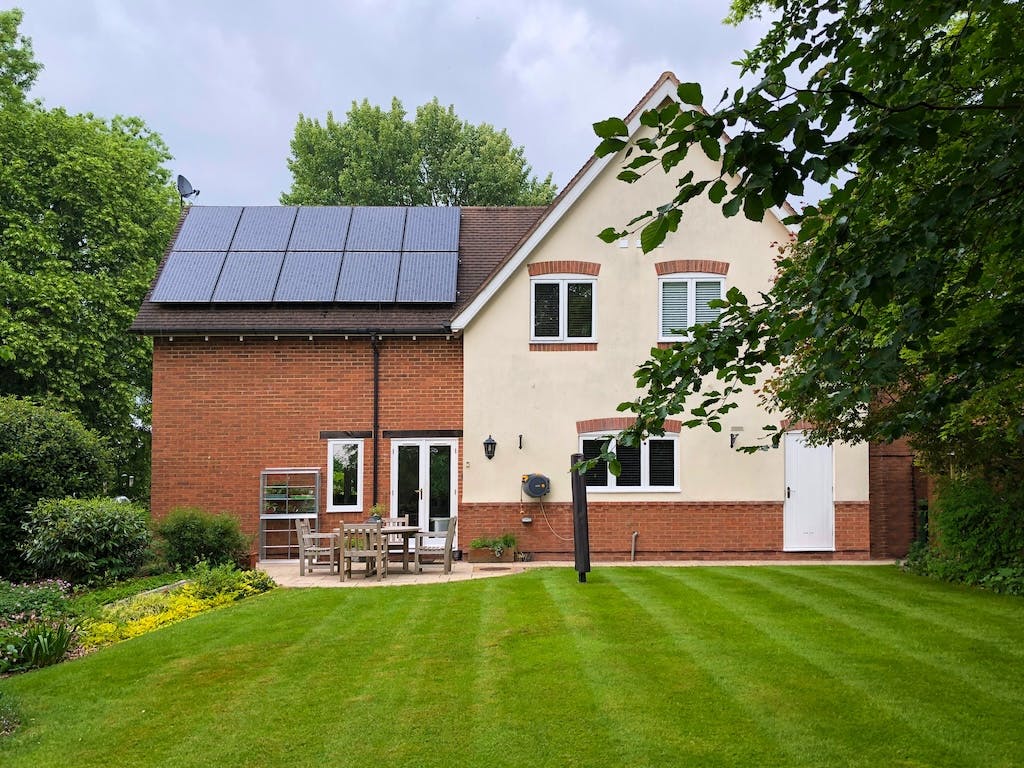
4. The Smart Export Guarantee
| Feature | Info |
|---|---|
| Requirements | Variable |
| How to apply | Contact your chosen supplier |
| Area covered | UK-wide |
| Solar costs covered | Zero upfront but £100s per year |
| When it started | January 2020 |
| When it ends | No set end date |
The Smart Export Guarantee (SEG) is a government-backed initiative that forces large energy suppliers to pay British households for the electricity they send to the grid, via an export tariff.
This scheme launched in January 2020, following the end of the Feed-in Tariff (FiT).
An export tariff can't reduce the upfront cost of going solar, but it can ensure you maximise your profits once you have panels on your home.
Many suppliers now offer multiple export tariffs alongside their obligatory ‘SEG’ tariff, which has led to ‘SEG tariff’ being commonly used as another way of saying 'export tariff'.
Verified expertThe Feed-in Tariff scheme was fantastic, and it came in at a time when the UK’s residential solar industry needed some serious encouragement. But we don’t really need the Feed-in Tariff today; solar panels are much better and can provide far greater energy bill savings, their costs have fallen dramatically, and some of the solar export tariffs pay very competitive rates.
Alfie Ireland
Head of Operations & Technical at Sunsave
Alfie has worked in green tech for over a decade. During his four years at OVO, he helped develop the world’s largest domestic vehicle-to-grid trial.
Are you eligible for the SEG?
To be eligible for SEG payments, you need to generate electricity with one of the following systems:
- Solar panels
- Wind turbines
- Hydroelectric systems
- Micro combined heat and power (micro-CHP)
- Biochemical processes like anaerobic digestion
Your installation can have a maximum capacity of up to five megawatts (or 50 kilowatts for micro-CHP), and you’ll need a smart meter to record how much electricity you export.
Make sure you use a reputable installer like the ones included in our list of the best solar panel installers in the UK, as your system must be certified to be eligible for SEG payments.
How much money can the SEG earn you?
If you're willing to switch energy suppliers, you can make £343 per year through the SEG by signing up to Good Energy's Solar Savings tariff, which pays 15p per kilowatt-hour (kWh).
This figure is based on a home that uses 3,400kWh of electricity per year (which is the UK average ) with solar irradiance of 850kWh per kWp, has a 4.6kWp solar panel system and 5.2kWh battery, and exports 65% of its solar electricity.
Your SEG earnings will vary depending on the export tariff you choose, how much solar electricity your system produces each year, and your electricity consumption patterns.
To find out the ideal export tariff for your household, check out our guide to the best SEG rates.
Depending on the tariff you choose, you may be paid monthly, quarterly, or annually.
You'll likely receive your earnings via a bank transfer, unless your export tariff supplier is the same as your import supplier – in which case the money will usually be taken off your energy bill each month.
You can combine SEG with other grants and financial support, except if you’re already receiving FiT export payments. You'll need to opt out of your FiT export payments before you can start receiving SEG earnings.
How to apply for the SEG
Just contact any of the energy suppliers currently offering an export tariff, and follow their guidance to sign up.
You'll need an export MPAN, but your tariff provider should get this for you from your Distribution Network Operator (DNO).
The whole process can take up to 11 weeks, but after that, you can sit back and watch your earnings roll in.
How many people have signed up for an SEG tariff?
415,172 solar panel systems signed up for an SEG tariff between the scheme launching in January 2020 and March 2024, according to the latest Ofgem data.
In the same time frame, 450,531 solar panel systems were installed in the UK , which means a massive 92% of new solar homes have chosen to get an export tariff.
This high adoption rate makes sense, since not signing up for an export tariff means giving away your electricity to the grid for free.
Ofgem's data includes all solar export rates, including those that aren't technically SEG tariffs.
5. Solar panel loans
| Feature | Info |
|---|---|
| Requirements | Variable |
| How to apply | Fill in a loan provider's application form |
| Area covered | UK-wide |
| Solar costs covered | 0% but you don’t usually have to pay upfront |
| When it started | N/A |
| When it ends | N/A |
Solar panel loans usually allow you to get a solar & battery system without having to pay anything upfront – though they don't tend to come with any monitoring or maintenance.
Instead, you’ll pay a monthly amount for a set number of years. This regular payment, the length of the loan, and the interest rate will all vary depending on your chosen provider.
Some companies also ask customers to pay a portion of the sum upfront, before monthly payments begin.
Solar panel loans usually range from two or three years to 10 years. Short-term loans can cost several hundreds of pounds per month, which can still be very expensive for most households.
That’s why we designed Sunsave Plus with a 20-year term. This is the UK’s first solar subscription, and by spreading the cost across 20 years, it could set you back less than £100 per month.*
Every Sunsave Plus system is also protected for the full term by the Sunsave Guarantee, which includes 24/7 monitoring, maintenance, a free battery upgrade and replacement inverter if needed, downtime cover, and insurance.
Lots of people around the country are already enjoying saving money with Sunsave Plus. To find out more about what our customers think, check out our reviews page.
*Figure of ‘less than £100 per month’ is based on multiple Sunsave Plus subscriptions beginning in 2024.
Are you eligible for solar panel loans?
To be eligible for a solar panel loan, you generally need to meet certain criteria. For instance, you usually have to own your home, fall in a certain age range, and be a UK resident.
In the case of Sunsave Plus, your application can have up to two applicants, and must fulfil these criteria:
- The lead applicant must be an owner of the property
- At least one applicant must be between 18 and 65 years old
- Both applicants must be UK residents
You won’t be eligible for Sunsave Plus if you’ve been declared bankrupt or received a county court judgement.
How much money can solar panel loans save you?
Solar panel loans can't save you any money by themselves, but they allow you to avoid paying the full cost of your solar panel system upfront – and they can enable you to save in other ways.
After all, you can take the money you would've spent on solar panels and invest it elsewhere, which could result in you generating considerable amounts of revenue over 20 years.
You could also make net savings with Sunsave Plus, as your monthly savings may exceed your monthly loan repayments.
We’ll do everything we can to make that happen, by designing a bespoke Sunsave Plus system to maximise your output, and by calculating the best import and export tariffs to boost your savings and earnings.
Thanks to the Sunsave Guarantee, Sunsave Plus can also save you money in ways most solar panel loans can't – for instance by supplying a free replacement battery and inverter, insurance, and monitoring and maintenance.
How to apply for a solar panel loan
Most solar panel loan providers simply require you to fill in an online application.
If you fulfil the company's initial requirements, you'll just need to choose the amount of time you want your loan to last for – usually three to 10 years – and complete a credit application.
You can apply for Sunsave Plus in much the same way, except it lasts for 20 years.
It's the UK’s first solar subscription rather than a solar panel loan, so it also comes with extra features, like a monitoring and maintenance package.
How many people get solar panel loans?
15% of Which? members got a solar panel loan in order to pay for their solar panels, according to a recent survey by the company.
If this holds true across the UK, it means more than 200,000 households have taken out solar panel loans.
It makes sense to look at all your options when you're trying to avoid the steep upfront cost of going solar. To find out how much you could save with Sunsave Plus, enter a few details below and we'll provide an estimate.
Find out how much you can save
What kind of home do you live in?
6. Green home rewards
| Feature | Info |
|---|---|
| Requirements | Variable |
| How to apply | Contact your mortgage provider |
| Area covered | UK-wide |
| Solar costs covered | Up to £1,000 in cashback |
| When it started | N/A |
| When it ends | N/A |
Green home rewards are cashback schemes offered by banks including Barclays, Halifax, and Lloyds to their own mortgage customers.
To qualify, homeowners with these banks have to sign up for the relevant scheme and make a qualifying energy-efficient improvement – like a solar & battery system.
Nationwide also has a green home reward scheme, but it's slightly different: customers can qualify for cashback not through eco-friendly measures, but simply by getting a mortgage on a property with an EPC rating of A or B.
All these schemes fall under the category of green mortgages, which are mortgages that include an incentive to either purchase an energy-efficient property or make eco-friendly improvements after you've moved in, according to the Financial Conduct Authority.
For more information, check out our guide to green mortgages and green home rewards.
Are you eligible for green home rewards?
Anyone who mortgages or remortgages their property with Barclays, Halifax, or Lloyds – and anyone who gets a mortgage with Nationwide – is eligible for a green home reward.
If you buy a home with a Nationwide mortgage that has an EPC rating of A or B, you should automatically receive your reward.
Nationwide will check your new home's EPC rating two weeks after it confirms your mortgage is in place, so there's no time to make improvements. To qualify, you just have to find a property that's already energy-efficient.
How much money can green home rewards earn you?
Green home rewards can earn you between £250 and £2,000, depending on the measures you take and the financial institution you choose to be your mortgage provider.
Barclays, Halifax, and Lloyds pay cashback amounts between £500 and £2,000 for installing a variety of measures, from solar panels and heat pumps to double glazing and loft insulation.
All three institutions will give you £1,000 if you install solar panels, with or without a battery.
Nationwide's Green Reward scheme gives new mortgage holders £500 if the property has an A-rated EPC, or £250 if it has a B-rated EPC.
Halifax, meanwhile, will give new mortgage customers £250 if their home's EPC rating is A or B.
How to access green home rewards
You can only access Halifax and Lloyds' green home rewards if you apply directly for one of their mortgages – in a branch, over the phone, or online – instead of going through a broker.
Every year, Halifax and Lloyds create an 11-month qualifying time period, so make sure to send in your mortgage application during this time, then register for a green home reward within the next month.
If you have a Barclays mortgage, there are no time limits on when you can apply for the bank's Greener Home Reward programme – but once you carry out your home improvements, the timer will start.
You have to submit your claim form within three months of the invoice or payment date, and if it's accepted, you’ll have one month to send proof that the works happened and you paid for them.
You shouldn't even need to apply for a Nationwide Green Reward cashback, but it's worth bringing up the initiative to a representative during the mortgage application process, just in case.
The surge of green home rewards in the UK
Green home rewards have exploded in popularity in recent years, alongside green mortgages.
From four green mortgage products in 2019, this market has grown to more than 60 products, according to the Green Finance Institute.
And 57% of major mortgage lenders now offer a green mortgage of some kind, according to the Mortgage Advice Bureau.
However, as long as these products continue to offer limited financial benefits, lenders will face accusations that they're meeting their own environmental targets without having any significant impact on homeowners or the climate.
7. Solar VAT discount
| Feature | Info |
|---|---|
| Requirements | Relaxed |
| How to apply | You don't have to apply |
| Area covered | UK-wide |
| Solar costs covered | £565-£2,260, on average |
| When it started | April 2022 |
| When it ends | March 2027 |
The solar VAT discount is part of the government's move in 2022 to change the VAT rate for a host of energy-saving materials to 0% in England, Scotland, and Wales.
The full list of qualifying products includes insulation, wind turbines, heating controls, heat pumps, and solar panels.
By reducing the upfront costs of installing energy-efficient devices, the policy aims to encourage households to switch to green energy.
In February 2024, this 0% rate was expanded to include standalone storage batteries.
The treasury has estimated that reducing the VAT rate on all these products to 0% will cost the government £280 million by 2026/27.
Are you eligible for the solar VAT discount?
Everyone is eligible for the solar VAT discount – all you need to do is buy a qualifying product.
It applies automatically if you buy any of the following:
- Solar panel system
- Solar battery
- Air, ground, or water source heat pump
- Micro-CHP system
- Heating controls
- Insulation
- Smart diverters
- Wind turbine
- Water turbine
- Wood boiler
How much money can the solar VAT discount save you?
This discount can lead to big savings. Energy-efficient materials used to be taxed at 20%, but if you were on benefits or the materials cost less than 60% of the installation, the rate was reduced to 5%.
With the introduction of the 0% VAT rate, the average three-bedroom household can save around £565 when buying a new 4.5kWp solar & battery system, or £2,260 for those who would've previously paid 20% VAT.
The discount of course varies depending on the price of your system.
How to access the solar VAT discount
There is no specific application process for the solar VAT discount, as it’s automatically applied at the time of purchase.
How many people have benefited from the VAT discount?
452,198 households in England, Scotland, and Wales benefited from the VAT discount in the three years after it came into force – from April 2022 to April 2025 – according to government data.
We'd expect around 300,000 more homes to benefit from the discount by March 2027, when it's set to end.
Even if we conservatively assume that all of these installations would've previously come with a 5% VAT rate, this still represents a rough overall saving of £425 million.
If you want to take advantage of the 0% VAT rate on solar before it expires, enter a few details below and we'll provide a quote and savings estimate.
Find out how much you can save
What kind of home do you live in?
8. The Warm Homes: Social Housing Fund
| Feature | Info |
|---|---|
| Requirements | Stringent |
| How to apply | Landlords can apply to the government |
| Area covered | England |
| Solar costs covered | Up to £7,500 |
| When it started | October 2020 |
| When it ends | September 2028 |
The Warm Homes: Social Housing Fund (WH:SHF) provides funding to local authorities and landlords to upgrade the energy efficiency of social homes in England.
It's the government's new name for the Social Housing Decarbonisation Fund, a scheme which has handed out more than £1 billion since it launched in October 2020.
Recipients must spend this money on improving the country's 1.2 million social homes that have an EPC rating below C, to ensure they reach that grade.
The third wave of funding and measures will end in September 2028, but it may well be followed by another.
The government has indicated that applicants in this wave should focus on improvements that will lower their homes' energy bills, such as solar & battery systems, insulation, and heat pumps.
Are you eligible for the WH:SHF?
All local authorities, social housing providers, and charities that own social housing are eligible to apply for wave three of WH:SHF, as long as they haven't benefited from wave two.
They can choose to apply by themselves, though they can apply as part of a consortium, and should especially consider doing so if they own fewer than 1,000 social homes.
Individual households cannot receive funding through WH:SHF, but if you live in a social home, you can certainly encourage your landlord to apply.
How much money can the WH:SHF save you?
Successful applicants will be handed up to £7,500 for every social home they run.
This means you could theoretically benefit from £7,500 worth of solar gear being installed at your home, whether you live in a house or a flat.
The year-round supply of solar electricity provided by your solar & battery system will massively reduce your energy bills, which should drive down your costs by hundreds of pounds per year.
How to apply for the WH:SHF
Eligible bodies can apply to the Department for Energy Security & Net Zero between 30 September and 25 November 2024.
A landlord or local authority must include at least 100 social homes with an EPC rating below C on their application, unless they manage fewer than 1,000 properties.
In this case, they should attempt to reach 100 homes by bringing other landlords into a consortium – but if this isn't possible, they can still submit a successful application.
Applicants must also show they intend to hire installers that have been approved by Trustmark, the only government-endorsed quality scheme in the UK for works in and around your home.
How many people get solar through the WH:SHF?
Overall, 12,215 solar arrays were installed through the WH:SHF during its first three years in operation.
3,140 solar panel systems were installed during wave one of the WH:SHF, which ran from March 2022 to March 2023.
A further 8,224 arrays were put on social homes during wave 2.1, which operated between April 2023 and March 2024.
Solar panels made up 10% of measures implemented during wave one, and this figure rose to 17% during wave 2.1.
Wave 2.2, which lasted from April 2024 to March 2025, saw another 851 solar panel systems installed, which represented 22% of all measures.
The current edition of the scheme is wave three, which the government has allocated £1.29 billion . The recipients, which were revealed in March 2025, must use their funding before March 2028.
Most common WH:SHF home improvements, Mar 22 - Jul 25
9. The Welsh Government Warm Homes Programme
| Feature | Info |
|---|---|
| Requirements | Stringent |
| How to apply | Call 0808 808 2244 |
| Area covered | Wales |
| Solar costs covered | Up to 100% |
| When it started | April 2024 |
| When it ends | April 2031 |
The Warm Homes Programme (WHP) is a refresh of the Welsh government's Warm Homes Nest Scheme, which ran from 2011 to 2024, spending £440 million to help more than 77,000 homes.
From April 2024 until at least April 2031, this new initiative will focus on improving Welsh households' insulation levels and installing modern innovations like heat pumps, rather than old solutions like gas boilers.
It's also focusing more on solar installations, which made up 18.3% of measures in 2022/23, under the previous scheme – though the great majority of these systems didn't come with a battery.
Are you eligible for the WHP?
You may be eligible for the Warm Homes Programme, as long as you:
- Own or privately rent your home
- Have an EPC rating of 54 (E) or lower; or 68 (D) or lower if a member of your household has a chronic circulatory, respiratory, or mental health condition
- Live in a low-income household or receive a qualifying means-tested benefit (see the list below)
The following benefits are eligible:
- Council Tax Reduction
- Housing Benefit
- Income-based Jobseeker’s Allowance
- Income-related Employment and Support Allowance
- Income Support
- Pension Credit
- Universal Credit
How much money can the WHP save you?
The Warm Homes Programme can save you thousands of pounds by fully funding the installation of measures from solar panels and heat pumps to insulation.
And once these improvements are in place, they can cut your energy bills by hundreds or even thousands of pounds per year.
How to apply for the WHP
To apply for this scheme, just call 0808 808 2244.
A staff member will ask you some questions to work out if you qualify, guide you through uploading evidence to prove your eligibility, and talk you through the measures you can access.
You can even apply on behalf of someone else, as long as they give their verbal consent while you're on the phone.
The whole process typically takes 30-40 minutes.
You'll then be able to arrange for British Gas to install any measures you've agreed upon.
How many people got solar through the WHP?
From April 2022 to March 2023, the former iteration of the WHP funded solar installations for around 800 households.
In total, the scheme enabled energy-saving improvements to 4,364 homes, meaning 18.3% of the scheme's recipients went solar.
Eco-friendly central heating systems made up the vast majority of measures.
Most common WHP home improvements, 2022-23
10. Green Homes Wales
| Feature | Info |
|---|---|
| Requirements | Relaxed |
| How to apply | Call 0808 808 2244, then submit a home assessment application |
| Area covered | Wales |
| Solar costs covered | Interest-free loans up to £25,000 |
| When it started | April 2025 |
| When it ends | 31 March 2027 |
Green Homes Wales (GHW) is a government scheme that offers interest-free loans for households to get energy efficiency measures.
Experts will assess participating homes, make bespoke recommendations, and work out if you could qualify for grant funding alongside your loan – all for free.
Homeowners can then get installations including solar & battery systems, heat pumps, and insulation, fitted solely by installers who comply with the latest Publicly Available Specification (PAS) 2035 retrofitting requirements.
The GHW, which is run by the Welsh Government-owned Development Bank of Wales, began as a pilot scheme from October 2024 to March 2025.
It was a success, with 3,000 households expressing an interest . However, when the scheme launched across the country in April 2025, it was with a £3 million budget for the financial year.
Unfortunately, this amount is only enough to fund 120 loans of £25,000 each. Even if the average loan amount were lower – say, £10,000 – there'd still only be enough money for 300 homes.
The government could inject more funding or extend the scheme if it proves popular, but there are no guarantees.
Who is eligible for Green Homes Wales?
There aren't many eligibility criteria for GHW.
You just need to own a home in Wales, and as long as it's your primary residence – and isn't a listed building or previously unoccupied new-build – you can qualify.
There are some credit checks and affordability assessments to pass, as with any loan, but the scheme is built to help a broader swathe of the public than most other initiatives.
Ultimately though, the scheme's £3 million of funding can only go so far, meaning it'll benefit a very limited number of households.
How much money can Green Homes Wales save you?
GHW offers interest-free loans of up to £25,000, that homeowners can use to fund energy-efficiency installations.
The loans last up to 10 years, though this repayment term can be extended for bigger projects.
Qualifying households also won't have to pay anything for the first six months. The Development Bank of Wales has said this is a "repayment holiday while your new energy efficiency measures begin delivering results."
How to apply for Green Homes Wales
The first step is to call Nest, the Welsh Government energy advice service, on 0808 808 2244, and discuss your options.
You can then fill in a form to register your interest, after which point you'll be issued with a home assessment application to fill in.
Once the government has processed that form, it'll assign you a retrofit coordinator, who'll assess your home and recommend improvements.
If you accept any of the proposed upgrades, you can contact approved installers and get their quotes. You'll then be ready to fill in your funding application.
When you receive a loan offer – which may also include grant funding – you can instruct your installer to start the project.
11. Social housing PPA schemes
| Feature | Info |
|---|---|
| Requirements | Relaxed |
| How to apply | No application – social housing providers make a deal with renewable suppliers |
| Area covered | UK-wide |
| Solar costs covered | 100% |
| When it started | N/A |
| When it ends | N/A |
Social housing Power Purchase Agreement (PPA) schemes are lease agreements between renewable suppliers and social housing providers for a property’s roof space for a set number of years.
These schemes typically involve a third-party company that finances, installs, and maintains the solar panels on the roofs of social housing properties.
In exchange, the tenants can get electricity from these panels at a cheaper rate than buying it from the grid.
The third-party provider can also sell any excess solar electricity to the grid, and reap the rewards.
For example, this has taken place in London, when the City of London council partnered with Voltalia in 2020 , and in Newport, when Newport City Council partnered with Egni Co-op in 2021.
Are you eligible for social housing PPA schemes?
As the PPA scheme is a business-to-business arrangement, it's only available to social housing providers or landlords directly.
How much money can social housing PPA schemes save you?
As a tenant, you’ll enjoy cheaper electricity, potentially adding up to hundreds of pounds in savings over the lifespan of the contract and/or panels.
The company involved can change the price of your electricity at any time, but it should always be cheaper than the rate you'd pay otherwise.
How to apply for social housing PPA schemes
There's no direct application process for tenants. Instead, social housing landlords need to enter into a PPA with a specialist provider.
12. Solar Together
| Feature | Info |
|---|---|
| Requirements | Relaxed |
| How to apply | Via Solar Together's website |
| Area covered | England & Wales |
| Solar costs covered | 30-35% average saving on the initial cost |
| When it started | 2015 |
| When it ends | N/A |
Solar Together is a company that organises group-buying programmes which allow households to buy and install solar & battery systems at a much lower cost than the average market price.
The scheme works by getting multiple homes in the same area to express an interest in going solar.
Solar Together then arranges an auction, in which solar companies each enter the amount they'd charge to install all the systems.
The lowest number wins, and the cost is shared by every household that chooses to move forward with their installation.
Are you eligible for Solar Together?
The scheme is open to homeowners, small or medium-sized businesses, and tenants (with their landlord’s permission).
However, it’s not available in every area. Check with Solar Together if your region is currently accepting sign-ups.
How much money can Solar Together save you?
You can expect Solar Together to knock off around 30% of a solar PV system’s typical market price, which is roughly the discount enjoyed by participants in Essex and Bristol.
The scheme uses group purchasing power and competitive bidding to lower your costs, which means results can vary.
Registration for Solar Together is free, and there's no obligation to proceed with an installation. The costs involved are only for the purchase and installation of the solar & battery system.
How to apply for Solar Together
The first step is to check on the Solar Together website if a scheme is running in your area. You can either register online or add your details to a waiting list to be notified when it becomes available in your region.
During the application process, you’ll need to provide details about your house, roof space, and typical electricity usage.
These will be used to send you a personal recommendation for the solar installation after the auction.
Our methodology
We went through all the eligibility criteria attached to the four main solar grants, rooting out the most recent government data to work out how many households meet each requirement.
Then we combined those numbers to come up with an accurate overall figure.
Defunct grants & schemes
The UK government has steadily reduced solar funding over the past few years, as is the case in other parts of Europe – more on that below.
After well over a decade of the government providing financial incentives for homes to go solar, the flood of grant money has slowed to a trickle.
The Feed-in Tariff is perhaps the most famous to fall by the wayside – though it technically continues to exist for some households that signed up before the final deadline.
Here are all the most important solar grants and schemes that have run their course.
| Grant/scheme | What it covered | When it expired |
|---|---|---|
| Home Upgrade Grant | Provided £700 million for English local authorities to fund energy-efficient upgrades in homes not on the gas grid | March 2025 |
| The Home Energy Scotland Grant & Loan | Grants and interest-free loans for energy-efficient improvements, including solar & battery systems | June 2024 for solar installations |
| The Renewable Heat Incentive | Paid owners of biomass boilers, heat pumps, and solar thermal systems based on the amount of heat they were estimated to produce | Stopped accepting new applications in March 2022 |
| The Feed-in Tariff | Paid domestic renewable generators for all the electricity they produced and exported | Stopped accepting new applications in March 2019 |
| The Green Deal | Offered loans, then grants, to encourage uptake of measures that saved and produced energy | July 2015 |
Diminished solar funding in Europe
The Scottish government was not alone in eliminating its main source of domestic solar funding when it ended Home Energy Scotland Grant and Loan’s solar section in June 2024.
Other European countries have also been scrapping solar grants.
In February 2023, Italy’s government put an end to the Superbonus, which paid back 110% of the cost of solar installations in tax credits when it launched in 2020.
This was reduced to 90% in January 2023, then scrapped entirely the next month.
In January 2024, the Belgian region of Flanders – where most people in the country live – ended its premiums for solar panels and batteries, which netted households a maximum of €1,725 (£1,450) a piece.
And Greece ended net metering in the country in June 2024, meaning households can’t currently earn any money from the surplus solar electricity their panels generate.
Next steps
There are several grants and initiatives to help make the cost of solar panels more affordable – and profitable – for households all over the UK.
However, all of the best options – like the WH:LG, Welsh government's WHP, and ECO4 – are targeted at the most disadvantaged households on these shores, and have stringent criteria as a result.
Most other grants don't properly address the biggest barrier: the upfront cost. The SEG, green home rewards, and even the VAT discount are worthy initiatives, but they're incentives rather than a proper solution.
If you want to avoid the high upfront cost of solar panels, you should find out if Sunsave Plus will work for you. To sign up for the UK's first solar subscription, enter a few details below and we'll be in touch.
Find out how much you can save
What kind of home do you live in?
Solar panel grants: FAQs
Related articles

Written byJosh Jackman
Josh has written about the rapid rise of home solar for the past six years. His data-driven work has been featured in United Nations and World Health Organisation documents, as well as publications including The Eco Experts, Financial Times, The Independent, The Telegraph, The Times, and The Sun. Josh has also been interviewed as a renewables expert on BBC One’s Rip-Off Britain, ITV1’s Tonight show, and BBC Radio 4 and 5.



